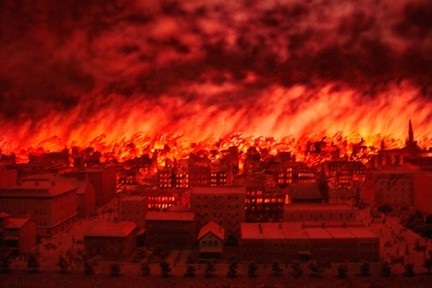History of Fire Prevention Week, Compiled by the NFPA
On the 40th anniversary of the Great Chicago Fire, the Fire Marshals' Association of North America (now known as the International Fire Marshal's Association), the oldest membership section of the National Fire Protection Association (NFPA), decided that the 40th anniversary of the Great Chicago Fire should be observed not with festivities, but in a way that would keep the public informed about the importance of fire prevention.

Fire Prevention Week was established to commemorate the Great Chicago Fire, the tragic 1871 conflagration that killed more than 250 people, left 100,000 homeless, destroyed more than 17,400 structures and burned more than 2,000 acres. The fire began on October 8, but continued into and did most of its damage on October 9, 1871. According to popular legend, the fire broke out after a cow - belonging to Mrs. Catherine O'Leary - kicked over a lamp, setting first the barn, then the whole city on fire. Chances are you've heard some version of this story yourself; people have been blaming the Great Chicago Fire on the cow and Mrs. O'Leary, for more than 130 years. But recent research by Chicago historian Robert Cromie has helped to debunk this version of events.
The 'Moo' Myth
Like any good story, the 'case of the cow' has some truth to it. The great fire almost certainly started near the barn where Mrs. O'Leary kept her five milking cows. But there is no proof that O'Leary was in the barn when the fire broke out - or that a jumpy cow sparked the blaze. Mrs. O'Leary herself swore that she'd been in bed early that night, and that the cows were also tucked in for the evening. But if a cow wasn't to blame for the huge fire, what was? Over the years, journalists and historians have offered plenty of theories. Some blamed the blaze on a couple of neighborhood boys who were near the barn sneaking cigarettes. Others believed that a neighbor of the O'Leary's may have started the fire. Some people have speculated that a fiery meteorite may have fallen to earth on October 8, starting several fires that day - in Michigan and Wisconsin, as well as in Chicago.

Fire Prevention Week
In 1920, President Woodrow Wilson issued the first National Fire Prevention Day proclamation, and since 1922, National Fire Prevention Week has been observed on the Sunday-through-Saturday period in which October 8 falls. In addition, the President of the United States has signed a proclamation pronouncing a national observance during that week every year since 1925.